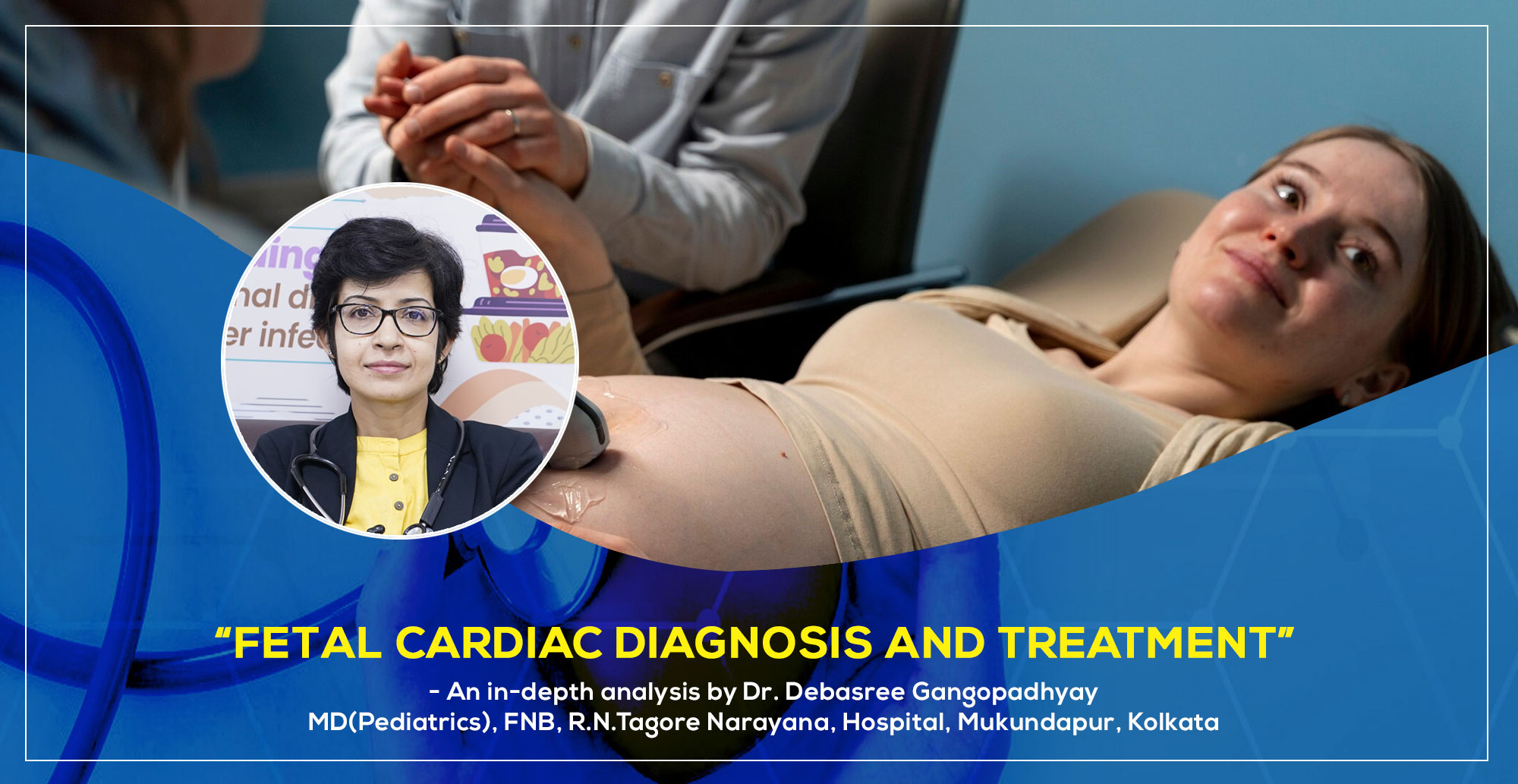Subtotal $0.00
Fetal Cardiac Diagnosis and Treatment: A Detailed Guide by Dr. Debasree Gangopadhyay
When it comes to caring for the heart health of an unborn child, expertise and precision are necessary. Renowned pediatric cardiologist in Kolkata, Dr. Debasree Gangopadhyay provides fetal cardiac diagnosis and treatment with both expertise and compassionate care. As a leading fetal echocardiologist in Kolkata and pediatric cardiologist in Kolkata, Dr. Gangopadhyay specializes in fetal cardiac diagnosis and treatment, providing families with essential guidance and care.
Introduction to Fetal Cardiac Diagnosis
Fetal cardiac diagnosis is the process of evaluating an unborn baby’s heart structure, rhythm, and function to identify any congenital heart abnormalities. This specialized diagnosis is typically performed using fetal echocardiography, an ultrasound test that allows detailed imaging of the fetus’s heart.
Dr.Debasree Gangopadhyay highlights the significance of early detection and intervention in fetal cardiac care, as early identification can better address or manage certain heart conditions. Her approach prioritizes informed and compassionate care that empowers parents to make decisions regarding their child’s cardiac health.
What is Fetal Echocardiography?
Fetal echocardiography, or fetal echo, is a non-invasive ultrasound test that provides a detailed image of the fetus’s heart. It is generally done in the second trimester, between weeks 18 and 24 of pregnancy, but can be conducted as early as 16 weeks in certain high-risk cases. Dr. Gangopadhyay, as an expert fetal echocardiologist in Kolkata, uses this imaging technique to assess various aspects of the fetal heart.
Click here for more videos
Key Features Assessed During a Fetal Echo
- Heart Structure: The four chambers, valves, and surrounding vessels are carefully analyzed.
- Heartbeat Rhythm and Rate: The test detects arrhythmias or irregular heart rhythms.
- Blood Flow: The sound waves create a picture by which a pediatric cardiologist checks for proper blood flow through the heart and main arteries.
- Functioning of Heart Valves: Each valve is observed to ensure it opens and closes correctly.
Who Needs Fetal Echocardiography?
While fetal echo can be performed as a routine check for many pregnancies, certain conditions make it especially recommended:
- Family History of Congenital Heart Defects: If either parent or a sibling has a congenital heart condition, the likelihood of the unborn child having a similar condition increases.
- Maternal Health Concerns: Pregnant women with conditions like diabetes, or infections may have an increased risk of fetal heart problems.
- Genetic Concerns or Abnormal Ultrasounds: Abnormal findings in regular ultrasounds or genetic tests may warrant a closer look at the fetal heart.
Types of Congenital Heart Defects Detected in Fetal Diagnosis
With expertise and advanced imaging, Dr. Gangopadhyay can detect a range of congenital heart defects (CHDs) early in pregnancy. Some of the common types include:
- Ventricular Septal Defects (VSD): Holes in the heart chambers that can affect normal blood flow.
- Underdevelopment Left or Right Heart Syndrome: Underdevelopment of one side of the heart, requiring special care and treatment.
- Tetralogy of Fallot: A combination of four heart defects affecting blood flow and oxygen levels.
- Transposition of the Great Arteries (TGA): A serious condition where the main arteries are switched, disrupting blood circulation.
- Coarctation of the Aorta: The congenital cardiac abnormality known as coarctation of the aorta (COA) is caused by narrowing of the aorta, the main artery that transports oxygen-rich blood from the heart to the body. If left undetected, this narrowing can cause major issues because this narrowing makes it difficult for blood to pass through to the body.
Causes and Risk Factors of Congenital Heart Defects
Factors such as genetic predisposition, maternal health, and environmental influences can increase the risk of congenital heart conditions. Early diagnosis is crucial for managing these risks effectively.
Understanding Fetal Cardiac Treatment Options
Once a diagnosis is confirmed, Dr. Gangopadhyay would give advice regarding the best treatment options based on the specific heart condition, severity, and other health factors of both the mother and the fetus.
Prenatal Management and Monitoring
In many cases, the treatment plan may include close monitoring and regular fetal echocardiograms to track the heart’s development and function. As a pediatric cardiologist in Kolkata, Dr. Gangopadhyay provides ongoing care to ensure that the baby’s heart condition is monitored up to birth. Furthermore, planning for delivery in a specialized hospital with immediate neonatal care ensures a seamless transition for any post-birth treatments.
Medications and Interventions
In certain situations, the mother may be prescribed medicine to help treat particular fetal heart abnormalities. For instance, fetal arrhythmias can be treated with specific drugs, which will stabilize the baby’s heart rate.
In rare and critical cases, in-utero interventions could be advised. Procedures like balloon valvuloplasty, which help to open a blocked valve in the fetal heart, may fall under this category. In- utero fetal intervention has not yet been started in Kolkata.
Delivery and Postnatal Care Planning
As a top pediatric cardiologist in Kolkata, Dr. Debasree Gangopadhyay collaborates with neonatologists and obstetricians to create a personalized birth and after-delivery treatment plan based on the severity of the disease. If necessary, this includes arrangements to undergo immediate cardiac surgery or a stay in the neonatal intensive care unit, where the baby’s heart may be closely monitored.
The Role of a Pediatric Cardiologist in Fetal Cardiac Care
Dr. Gangopadhyay’s expertise as a pediatric cardiologist in Kolkata makes her uniquely qualified to provide a continuum of care from prenatal stages through childhood. This long-term perspective is essential for managing congenital heart diseases, which often require monitoring and intervention as the child grows.
- Birth to Early Infancy: Dr. Gangopadhyay focuses on stabilization, which may include surgical procedures or medication to manage heart function.
- Childhood Follow-Up: Routine check-ups, echocardiograms, and sometimes additional procedures are crucial for children with complex heart conditions.
- Guidance for Parents: Dr. Gangopadhyay provides families with education on managing the child’s health, recognizing warning signs, and living a healthy, active lifestyle even with a heart condition.
Dr. Debasree Gangopadhyay’s Approach
Dr. Debasree Gangopadhyay is a highly skilled fetal echo cardiologist in Kolkata as well as a renowned interventionalpediatric cardiologist in Kolkata. Her approach focuses on early detection, precise diagnosis, and comprehensive care for children with heart conditions. Using advanced fetal echocardiography, she identifies heart issues in unborn babies, allowing parents and doctors to prepare for timely treatment after birth.
She collaborates closely with obstetricians and neonatologists to create specialized care plans, ensuring that every baby receives the best possible care. Her dedication extends beyond diagnosis—she supports families with guidance and emotional strength, making sure they feel confident during challenging times.
Dr. Gangopadhyay’s expertise and compassionate approach make her a trusted name in pediatric and fetal heart care, committed to nurturing young hearts with precision and care.
Counselling and Emotional Support for Parents
Learning about a fetal heart condition can be overwhelming for parents. Dr. Gangopadhyay ensures that families have the support they need throughout this journey, offering counselling sessions to discuss the diagnosis, treatment options, and long-term outcomes. She encourages parents to ask questions, voice their concerns, and gain a thorough understanding of their child’s health needs.
Read Also:
- Ensuring Pediatric Heart Health with Intervention Cardiologists in Kolkata
- Child Heart Health Awareness: Tips for Parents
- Navigating Congenital Heart Disease Care in Kolkata
Conclusion
In conclusion, fetal cardiac diagnosis and treatment are crucial for ensuring the best outcomes when congenital heart issues are a concern. With the expertise of Dr. Debasree Gangopadhyay, families receive advanced care and compassionate support throughout this journey. Her skills as a fetal echo cardiologist and pediatric cardiologist help in early detection, effective planning, and timely interventions, offering hope and reassurance to parents. Through her guidance, parents are better equipped to navigate the complexities of congenital heart disease and embrace a hopeful path forward for their child’s heart health.
By working closely with parents and other medical specialists, Dr. Gangopadhyay paves the way for healthier futures, ensuring that every baby receives the care they need for a strong and healthy heart.
FAQs : Fetal Cardiac Diagnosis and Treatment in Kolkata
1. When is the best time for a fetal echocardiogram?
A fetal echo is best performed between 18-24 weeks of pregnancy, but it may be done earlier if there are high-risk factors or concerns identified in initial scans.
2. What happens if a major cardiac defect is discovered during the diagnosis?
Many heart defects are treatable, especially with early detection. Dr.Debasree Gangopadhyay works with a multi-disciplinary team to develop a comprehensive plan for managing even the most complex heart conditions.
3. Can lifestyle changes impact fetal heart health?
While some heart conditions are genetic, a healthy maternal lifestyle can support overall fetal health. Dr. Gangopadhyay encourages expectant mothers to maintain a balanced diet, avoid harmful substances, and attend regular check-ups.
4. Will my baby need surgery after birth?
Depending on the heart condition’s nature and severity, surgery may be recommended shortly after birth. Dr. Gangopadhyay provides tailored planning for such cases, ensuring that everything is in place for the child’s postnatal care.
5. Can all heart conditions be detected before birth?
While many can be identified through fetal echocardiography, some such as ASD, PDA may only become apparent after birth.
6. Why Choose Dr. Debasree Gangopadhyay for pediatric cardiac consultancy?
Dr. Gangopadhyay’s dedication to heart care in Kolkata has earned her a reputation for both her technical skill and her compassionate approach. As a fetal echo cardiologist in Kolkata, she prioritizes early detection, personalized treatment plans, and parental support. Her holistic approach ensures that families are not only informed but also empowered to make decisions for their child’s best possible health outcomes.
7. What is the long-term outlook for children with congenital heart issues?
With proper medical care and monitoring, many children lead healthy, active lives.

Mousumi Mukherjee is a renowned digital marketing consultant based in Kolkata, India. Her Vast experience in content creation & marketing strategy, social media marketing, and SEO helps to assist companies in growing their online presence. With her extensive experience across multiple industries, Mousumi customizes digital strategy according to each client’s specific requirements. She is determined about staying ahead of digital trends, so she constantly refines her strategy to deliver quantifiable results. She likes to impart her knowledge through seminars and blogs, enabling people to succeed in the digital world.




Comments are closed